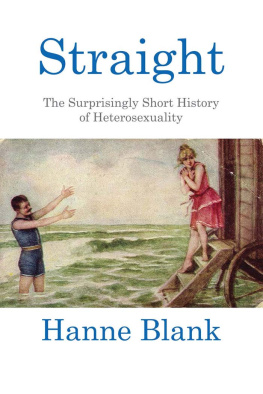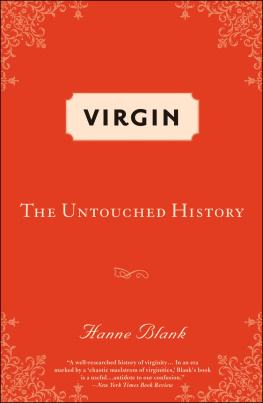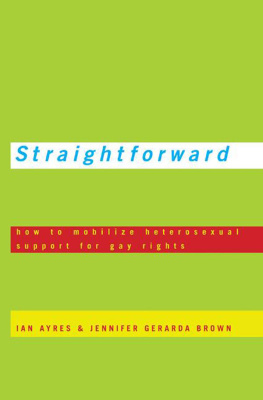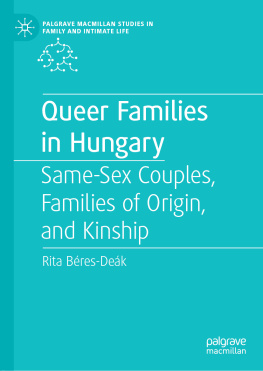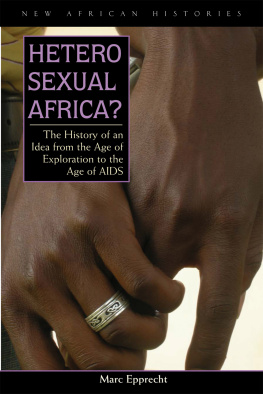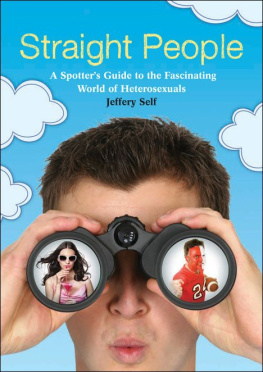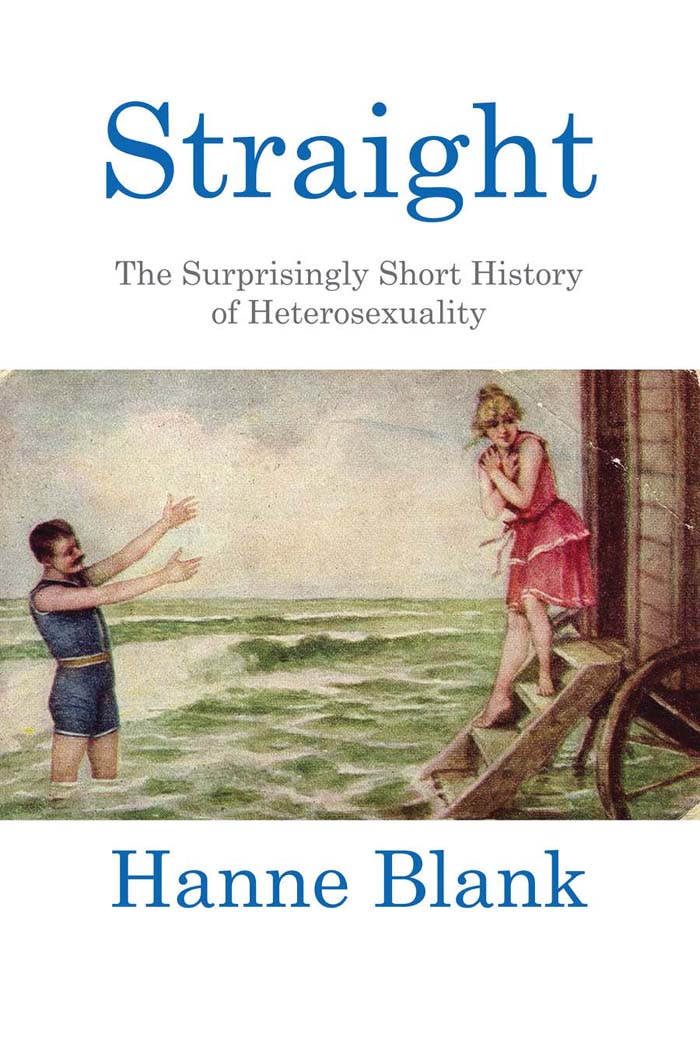STRAIGHT
THE SURPRISINGLY SHORT HISTORY
OF HETEROSEXUALITY
HANNE BLANK
Beacon Press Boston
For Malcolm
CONTENTS
Sexual Disorientation
The Love That Could Not Speak Its Name
Carnal Knowledge
Straight Science
The Marrying Type
Whats Love Got to Do with It?
The Pleasure Principle
Here There Be Dragons
INTRODUCTION
Sexual Disorientation
Every time I go to the doctor, I end up questioning my sexual orientation. On some of its forms, the clinic I visit includes five little boxes, a small matter of demographic bookkeeping. Next to the boxes are the options gay, lesbian, bisexual, transgender, or heterosexual. Youre supposed to check one.
You might not think this would pose a difficulty. I am a fairly garden-variety female human being, after all, and I am in a long-term monogamous relationship, well into our second decade together, with someone who has male genitalia. But does this make us, or our relationship, straight? This turns out to be a good question, because there is more to my relationshipand much, much more to heterosexualitythan easily meets the eye.
Theres biology, for one thing. My partner was diagnosed male at birth because he was born with, and indeed still has, a fully functioning penis. But, as the ancient Romans used to say, barba non facit philosophuma beard does not make one a philosopher. Neither does having a genital outie necessarily make one male. Indeed, of the two sex chromosomesXYwhich would be found in the genes of a typical male, and XX, which is the hallmark of the genetically typical femalemy partners DNA has all three: XXY, a pattern that is simultaneously male, female, and neither.
This particular genetic pattern, XXY, is the signature of Kleinfelter Syndrome, one of the most common sex-chromosome anomalies. XXY often goes undiagnosed because the people who have it often look perfectly normal from the outside. In many cases, XXY individuals do not find out about their chromosomal anomaly unless they try to have children and end up seeing a fertility doctor, who ultimately orders an image called a karyotype, essentially a photo of the persons chromosomes made with a very powerful microscope. In a karyotype, the trisomy, or three-chromosome grouping, is instantly revealed. As genetic anomalies go, this particular trisomy is not a cause for major alarm (aside from infertility, it causes few significant problems), which is a good thing, since it is fairly common. The estimates vary, in part because diagnosis is so haphazard, but it is believed that as many as one in every two thousand people who are declared male at birth may in fact be XXY. At minimum, there are about half a million Americans whose genetics are this way, most of whom will never know it.
What does an unusual sexual biology mean for sexual orientation? Is it even possible for XXY people to have a sexual orientation in the way we usually think about sexual orientation? What about their lovers, partners, and spouses? Heterosexual, homosexual, and bisexual are all dependent on the idea that there are two, and only two, biological sexes. What happens when biology refuses to fit neatly into this scheme? If Im attracted to, and in love with, someone who is technically speaking neither male nor female, does that make me heterosexual, homosexual, bisexual, or something else altogether? Who gets to decide? And, more to the point, on what grounds?
Some would argue that genetics arent as important as anatomy and bodily functions. After all, you cant see chromosomes with the naked eye. But here, too, I run into problems. Part of what makes a man, as we are all taught from childhood, is that he has a penis and testicles that produce sperm, which in turn are necessary to fertilize a females egg cells and conceive a fetus. The ability to sire a child has been considered proof of masculinity for thousands of years. This is something my partner cannot do. His external plumbing looks and acts pretty much like any genetically typical males, but, in the words of one of my partners vasectomied coworkers, he shoots blanks. In my partners case, no vasectomy was required. His testicles do not produce viable sperm. They never have and never will. This is part of the territory for most people who have XXY sex chromosomes.
So if heterosexuality is by definition, as some of our right-wing brothers and sisters like to claim, about the making of babies, then there is no possible way for my partner and me to be construed as heterosexual. But even the Bible recognizes that infertility exists. The notoriously procreation-fixated Catholic Church permits marriage, and marital sex, between people known to be infertile. Curiously, whether or not reproduction is a cornerstone of heterosexuality seems to depend on whom you ask, and in what circumstances.
Not that it really matters in practice. At this point in time contraception is more the rule than the exception for sexual activity between different-sex partners throughout the first world. Many people, including members of committed male/female couples, dont have children or plan to have them, yet somehow this doesnt stop them from feeling quite certain that they know what their sexual orientations are. They consider sexual orientation as being rooted in a calculus of subjective attraction and biological sameness. The Greek hetero means other or different, after all, and biological men and women do differ from one another. We make use of these biological differences every day without thinking every time we look at people and identify them as either male or female, ask whether a baby or a dog is a boy or a girl, or determine the sexes of the members of a couple we spot on the street and assign them sexual orientations in our minds.
Surely such informal, man-in-the-street diagnostics ought to apply just as well to my partner and me. Or perhaps not. As an XXY individual who has chosen not to take hormone supplements, my partners naturally occurring sex hormones take a middle path. His estrogen levels hang out a little lower than mine, his testosterone levels a little higher. As a result, my partner, like other XXY people who dont take exogenous hormones, has an androgynous appearance, with little to no facial and body hair, a fine smooth complexion, and a tendency to develop small breasts and slightly rounded hips if he puts on a little weight.[shot us little conspiratorial smiles of recognition. (We always smiled back. Still do.) But it wasnt all pleasantries. Once while walking together we had bottles thrown at us from a car, its occupants screaming Fuckin dykes! out the windows as they sped away. Assumptions of sexual orientation are never merely innocent perceptions, because these perceptions shape behavior.
Assumptions about biology and gender are complicated, fraught, and by no means clear or unambiguous. The ways people have identified my partners biological sex, and therefore not only the nature of our relationship to one another but also our respective sexual orientations, have run an extraordinary gamut that might be distressing if we hadnt long ago learned to laugh at it all. My partners physical androgynythe minimal facial hair, refined complexion, and elegant, long-limbed build that are common side effects of his genetic anomalyhas led some people to assume that he is a female-to-male transsexual who is early in the transition process, still more hormonally female than male. I have heard him identified as a passing butch. Once, at a party, I overheard a woman stating with assurance that my partner was a very feminine gay man who had made an exception for me. At other times I have been assumed to be the one making the exception, a hasbian who turned from dating women to seeing a gentle, feminine straight man. By the same token, these reactions have changed as weve aged and our styles of dress and grooming have changed. For the past several years, with my partner usually dressing in corporate-office menswear and sporting a dashing haircut modeled on the young Cole Porters, we have typically, though not always, been read as heterosexual. If the range of responses weve had can tell me anything about what my sexual orientation is supposed to be, its that other people dont necessarily know what box I should be checking off on those clinic forms either.

